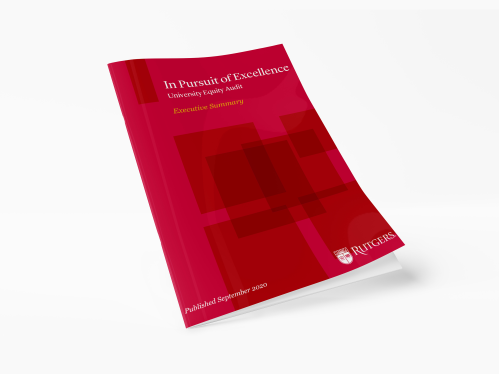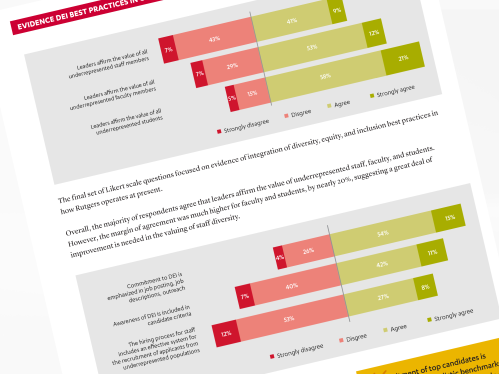
University Equity Audit
A Commitment to Diversity, Equity, and Inclusion
To better understand the challenges and supports needed to cultivate a culture of inclusive leadership at Rutgers, President Holloway commissioned a University Equity Audit. This comprehensive assessment was our first step in pursuing excellence by increasing Rutgers’ on-the-ground commitment to diversity, equity, and inclusion across the university, starting with its leadership. This three-pronged project included: a central administration self-study, a university leadership perceptions survey, and an equity scorecard.
Executive Summary
The Executive Summary outlines the key findings from the University Equity Audit, which will shape the development of a universitywide diversity strategic planning process to be launched this academic year that brings in the voices, ideas, and energy of the diverse stakeholders in the Rutgers community.

Report
The conclusions of the University Equity Audit are detailed in the Report. The results are sobering, identifying where our current practices deviate from our aspirations and outlining areas in need of focused attention to support institutional change.

Frequently Asked Questions
Understand the objectives of the audit and next steps by reading the frequently asked questions.


University Leadership Perceptions Survey Key Findings
The university leadership perceptions survey was an opportunity for the central administration to learn what perspectives they share, how they are perceived by others, and what needs to be done to maximize Rutgers’ opportunity to attain excellence.
view inadequate attention to diversity, equity, and inclusion as risky for the university.
of leaders report that diversity, equity, and inclusion is “very important” to Rutgers’ mission and future success.
“strongly agree” or “agree” that leaders affirm the value of underrepresented students.
perceive the people at Rutgers with whom they work most directly as “very committed” to inclusion.
Rutgers Equity Scorecard
The scorecard uses quantitative metrics to measure access, retention, success, and leadership representation for historically underrepresented groups by race and gender at Rutgers.